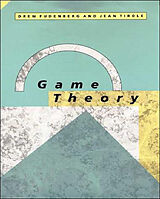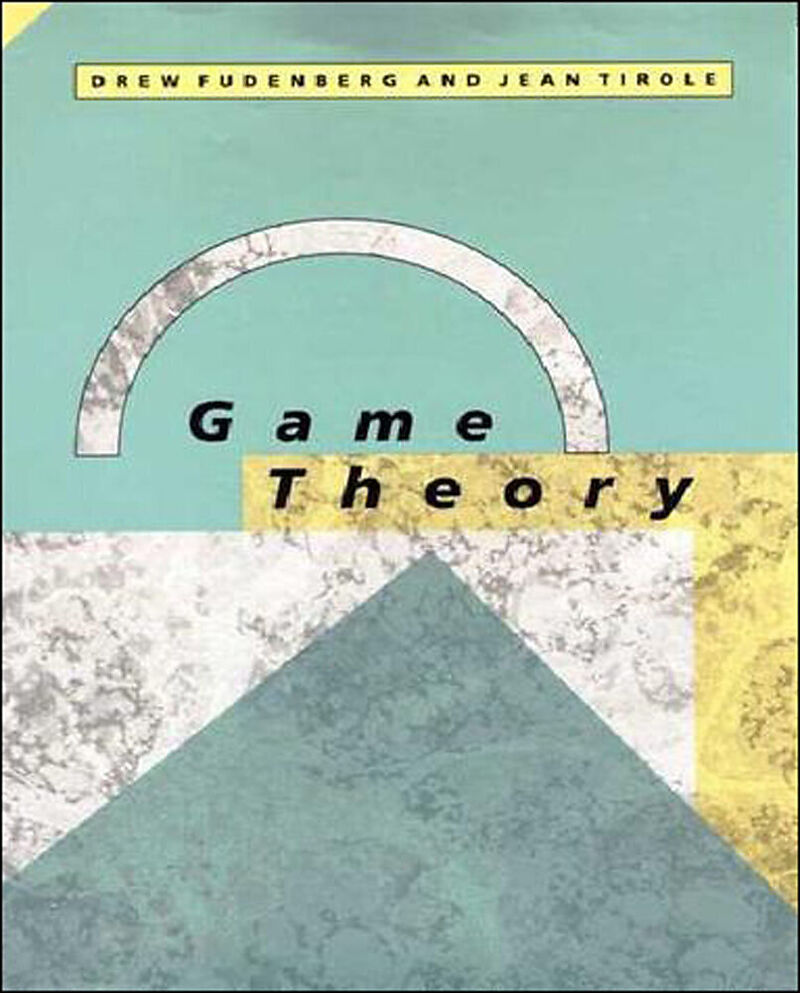Game Theory
Einband:
Fester Einband
EAN:
9780262061414
Untertitel:
Englisch
Autor:
Drew Fudenberg, Jean Tirole
Herausgeber:
MIT Press
Auflage:
New
Anzahl Seiten:
604
Erscheinungsdatum:
29.08.1991
ISBN:
0262061414
Informationen zum Autor Drew Fudenberg is Professor of Economics at MIT. Jean Tirole, the 2014 Nobel Laureate in Economics, is Scientific Director of IDEI (Institut d'Economie Industrielle), Chairman of the Board of TSE (Toulouse School of Economics), and Annual Visiting Professor of Economics at MIT. Klappentext This advanced text introduces the principles of noncooperative game theory in a direct and uncomplicated style that will acquaint students with the broad spectrum of the field while highlighting and explaining what they need to know at any given point. This advanced text introduces the principles of noncooperative game theoryincluding strategic form games, Nash equilibria, subgame perfection, repeated games, and games of incomplete informationin a direct and uncomplicated style that will acquaint students with the broad spectrum of the field while highlighting and explaining what they need to know at any given point. The analytic material is accompanied by many applications, examples, and exercises. The theory of noncooperative games studies the behavior of agents in any situation where each agent's optimal choice may depend on a forecast of the opponents' choices. "Noncooperative" refers to choices that are based on the participant's perceived selfinterest. Although game theory has been applied to many fields, Fudenberg and Tirole focus on the kinds of game theory that have been most useful in the study of economic problems. They also include some applications to political science. The fourteen chapters are grouped in parts that cover static games of complete information, dynamic games of complete information, static games of incomplete information, dynamic games of incomplete information, and advanced topics. Zusammenfassung This advanced text introduces the principles of noncooperative game theory in a direct and uncomplicated style that will acquaint students with the broad spectrum of the field while highlighting and explaining what they need to know at any given point. This advanced text introduces the principles of noncooperative game theoryincluding strategic form games, Nash equilibria, subgame perfection, repeated games, and games of incomplete informationin a direct and uncomplicated style that will acquaint students with the broad spectrum of the field while highlighting and explaining what they need to know at any given point. The analytic material is accompanied by many applications, examples, and exercises. The theory of noncooperative games studies the behavior of agents in any situation where each agent's optimal choice may depend on a forecast of the opponents' choices. "Noncooperative" refers to choices that are based on the participant's perceived selfinterest. Although game theory has been applied to many fields, Fudenberg and Tirole focus on the kinds of game theory that have been most useful in the study of economic problems. They also include some applications to political science. The fourteen chapters are grouped in parts that cover static games of complete information, dynamic games of complete information, static games of incomplete information, dynamic games of incomplete information, and advanced topics. Inhaltsverzeichnis Part 1 Static games of complete information: games in strategic form and Nash equilibrium; iterated strict dominance! rationalizability! and correlated equilibrium. Part 2 Dynamic games of complete information: extensive-form games; applications of multi-stage games with observed actions; repeated games. Part 3 Static games of incomplete information: Bayesian games and Bayesian equilibrium; Bayesian games and mechanism design. Part 4 Dynamic games of incomplete information: equilibrium refinements - perfect Bayesian equilibrium! sequential equilibrium! and trembling-hand perfection; reputation effects; sequential bargaining under incomplete information. Part 5 Advanced topics: more equilibrium re...
Autorentext
Drew Fudenberg is Professor of Economics at MIT.
Jean Tirole, the 2014 Nobel Laureate in Economics, is Scientific Director of IDEI (Institut d'Economie Industrielle), Chairman of the Board of TSE (Toulouse School of Economics), and Annual Visiting Professor of Economics at MIT.
Klappentext
This advanced text introduces the principles of noncooperative game theory in a direct and uncomplicated style that will acquaint students with the broad spectrum of the field while highlighting and explaining what they need to know at any given point.This advanced text introduces the principles of noncooperative game theory—including strategic form games, Nash equilibria, subgame perfection, repeated games, and games of incomplete information—in a direct and uncomplicated style that will acquaint students with the broad spectrum of the field while highlighting and explaining what they need to know at any given point. The analytic material is accompanied by many applications, examples, and exercises. The theory of noncooperative games studies the behavior of agents in any situation where each agent's optimal choice may depend on a forecast of the opponents' choices. "Noncooperative" refers to choices that are based on the participant's perceived selfinterest. Although game theory has been applied to many fields, Fudenberg and Tirole focus on the kinds of game theory that have been most useful in the study of economic problems. They also include some applications to political science. The fourteen chapters are grouped in parts that cover static games of complete information, dynamic games of complete information, static games of incomplete information, dynamic games of incomplete information, and advanced topics.
Inhalt
Part 1 Static games of complete information: games in strategic form and Nash equilibrium; iterated strict dominance, rationalizability, and correlated equilibrium. Part 2 Dynamic games of complete information: extensive-form games; applications of multi-stage games with observed actions; repeated games. Part 3 Static games of incomplete information: Bayesian games and Bayesian equilibrium; Bayesian games and mechanism design. Part 4 Dynamic games of incomplete information: equilibrium refinements - perfect Bayesian equilibrium, sequential equilibrium, and trembling-hand perfection; reputation effects; sequential bargaining under incomplete information. Part 5 Advanced topics: more equilibrium refinements - stability, forward induction, and iterated weak dominance; advanced topics in strategic-form games; payoff-relevant strategies and Markov equilibrium; common knowledge and games.

Leider konnten wir für diesen Artikel keine Preise ermitteln ...
billigbuch.ch sucht jetzt für Sie die besten Angebote ...
Die aktuellen Verkaufspreise von 6 Onlineshops werden in Realtime abgefragt.
Sie können das gewünschte Produkt anschliessend direkt beim Anbieter Ihrer Wahl bestellen.
Loading...
Die aktuellen Verkaufspreise von 6 Onlineshops werden in Realtime abgefragt.
Sie können das gewünschte Produkt anschliessend direkt beim Anbieter Ihrer Wahl bestellen.
| # | Onlineshop | Preis CHF | Versand CHF | Total CHF | ||
|---|---|---|---|---|---|---|
| 1 | Seller | 0.00 | 0.00 | 0.00 |
